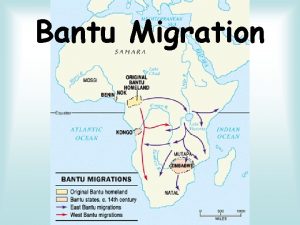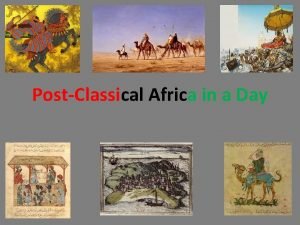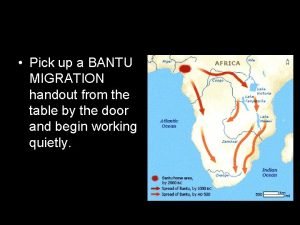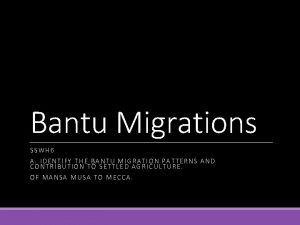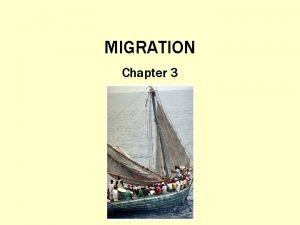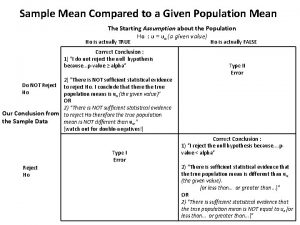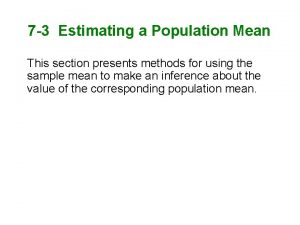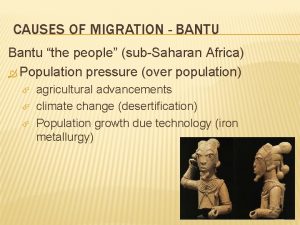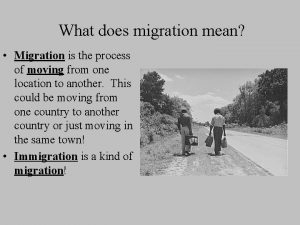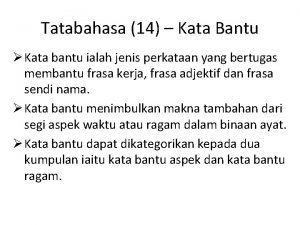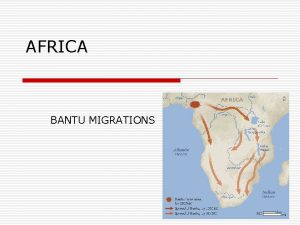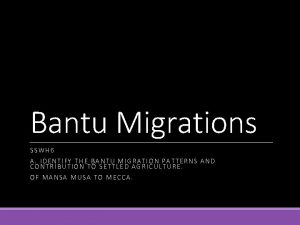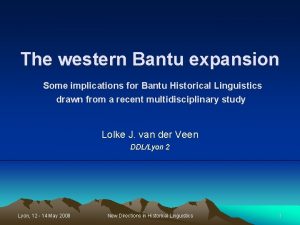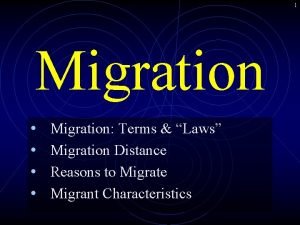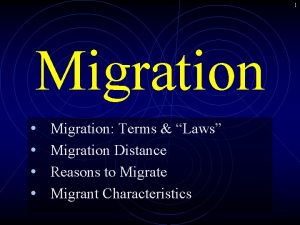Bantu Migration What does Bantu mean Bantu is
Bantu Migration





What does “Bantu” mean? • Bantu is a common term used to refer to over 400 different ethnic groups of Africa stretching from south of the Sahara desert to South Africa that have similar languages and to some extent customs. • Their migrations are their large scale movements over long distances.

Who are the Bantu? • A linguistically related group of about 60 million people living in equatorial and southern Africa. • They originated in West Africa, migrating downward gradually into southern Africa. * This migration was one of the largest in human history.

How did they get the name “Bantu”? • These people were given the name ‘Bantu’ because of the similarities that were noticed in their languages. – For example, the prefix ‘ba-’ and the suffix ‘-ntu’ was common among the languages they spoke.

Why did they migrate? • There are several reasons why the Bantu people migrated South. • These reasons can be categorized into political, economic, and social. • The exact cause of their movement is uncertain. • It’s believed they migrated because of a population increase. This was a result of the introduction of new crops, such as the banana (native to south Asia), which increased the food supply.

Niger-Congo B (Bantu)

Political Reasons for Bantu Migration • Succession disputes in some cases led to the migration of some groups. – This normally happened when a king died and members of the royal family quarreled about who should succeed. • Convicted people or criminals migrated in order to run away from being punished or killed. • Tribal wars caused migrations as defeated tribes ran away from powerful ones for safety. • Expansion- Some rulers wanted to expand their kingdoms and therefore migrated in search of new areas.

Economic Reasons for Bantu Migration • The drying up of the Sahara grasslands. This led the groups that practiced agriculture to migrate in search of new fertile land water for farming. • Occupation, agriculture, hunting, etc.

Social Reasons for Bantu Migration • Some groups or individuals migrated merely for adventure. They did this so that they could explore and see what other lands were like. = AMBITION • There was a population increase. This created pressure causing others to migrate in search of new land. • Slave trade contributed to the migrations – to avoid being attacked and sold as slaves, some groups were forced to migrate.

It is important to understand that these movements did not occur at once. They took place in phases.

It is important to understand that these movements did not occur at once. They took place in phases. • It is unclear when exactly the spread of Bantuspeakers began. • By 1500 BC Bantu-speaking communities had reached the great Central African rainforest. • By 1000 BC a major new population center near the Great Lakes of East Africa had developed. • By 500 BC groups had emerged into the savannahs to the south, in what are now the Democratic Republic of Congo, Angola and Zambia. • Groups had reached South Africa by 300 AD.

Are the Bantu still around? • YES! The Bantu people are still around. • They make up about 2/3 rd of Africa's population. • They inhabit the southern half of the continent. • Early in their history, the Bantu split into two major linguistic branches, the Eastern and Western language branches. – The Eastern branch migrated through present-day Zimbabwe and Mozambique, down to South Africa. – The Western branch moved into what is now Angola, Namibia, and north-western Botswana.

What are some effects of the Bantu migration on Sub-Saharan Africa? ? ?
- Slides: 17
